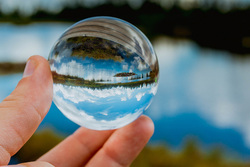
I stumbled across an article the other day that got me thinking about this, and I thought I'd try to clear up some of the confusion here on the blog today. The article (linked below) explained how most people think that holistic living isn't realistic for them. They assume it will be too difficult, or that it will mean giving up the things they enjoy.
First of all, let me just say that holistic living is not some sort of diet! In fact, it's not a specific prescription for anything; rather, it is simply a way of living that recognizes the connections between yourself, others, and the world, respects these natural connections, and attempts to maintain a healthy balance between all aspects of life.
Living holistically doesn't mean you have to buy only organic foods, use only 100% natural products, avoid all Western medicine doctors and prescription drugs, go vegan, or move "off the grid" and live in a yurt! It also doesn't mean you have to spend hours every day meditating, never get angry, or live in some sort of Zen-like bubble untouched by the world.
After all, you're still a human being, and as messed up as this world is sometimes, you still have to live in it - and holistic living can actually help you do just that - in a healthier and happier way.
So how do you achieve this state of balance?
The path is individual for each person, but in general, you will simply want to start becoming aware of the connections in the world around you, as well as within your body. Here are a few things to pay attention to:
* Notice how you feel when you eat certain foods. Pay attention to their effects on your body.
* Learn about how your food was raised and grown - and what this means for the planet. How does your choice of food at the grocery store impact the health of the soil, air, and water? Most people don't think about the fact that these things are intimately connected!
* Take the time to research the ingredients in the products you use in your home and on your body. How do these ingredients interact with each other? What impact do they have on your health? What problems could they potentially create down the road - especially if they accumulate in water supplies - or bodily tissues?
* Research the side effects of any prescription drugs you take. Pay attention not just to short-term side effects like headaches or hair loss, but also to potential long-term issues like high blood pressure or an increased risk of diabetes. Find out how long the drugs have been in use, and if they have a track record of reported adverse reactions. Are there any alternatives that will accomplish your desired goal, without the side effects?
* Lastly, forgive yourself for not being perfect. No one is. Everyone slips up. Don't beat yourself up about it if you eat a doughnut once in a while, or skip your workout when you're feeling extra tired. But don't let yourself off the hook too often, either. Remember, it's all about balance! Holistic living is not just about eating "clean" or organic all the time, or spending hours doing yoga. It is about a balance of the mind and spirit as well, which means it also encompasses cultivating healthy and positive relationships with others, with the world around you, and with your higher power.
So what now? I don't want to get all prescriptive in this post, as my goal is simply to get you thinking about the items above. But once you really start to delve into these various things, you will likely find your mindset starts to shift.
You will naturally find yourself gravitating towards foods that nourish your body, rather than mindlessly eating whatever looks good on your trip down the grocery store aisle.
You will consciously choose to use products that are less harmful to the environment and to your health (fortunately, there are more and more options available these days).
You will start asking thoughtful questions of your doctor or healthcare provider before taking a medication. And you will seek healthier alternatives whenever possible.
Basically, you will begin to look at the world in a more holistic way - and consider how one aspect impacts another before making choices. When you start thinking from a holistic mindset, holistic living becomes a lot easier than you might have imagined.
Lastly, keep in mind that creating a healthy and holistic lifestyle should not diminish your life in any way - whether it be the enjoyment of your food, or participating in social activities and enjoying community with others. Instead, it should add to your life, by giving you a sense of connection to the world around you, helping you to understand your place in the greater whole, and inspiring you to appreciate, enjoy, and care for your wonderful body.
As the article I mentioned above concludes, holistic living "should be the foundation that allows you to live a longer, healthier, and happier life."
I absolutely agree!
To your (holistic) health,
Rose.



 RSS Feed
RSS Feed